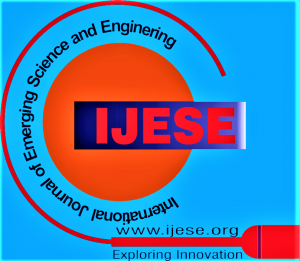![]()
Modelling the Integration of Core Competencies among Students of Technical Colleges through Work-Based Learning in North-Western States, Nigeria
Gimba Dogara1, Ponfa Mamfa Jantur2, Yaki Akawo Angwal3, Gillian Gyeyok Ashio4, Fadipe Bayo Michael5
1Gimba Dogara, Department of Technical Education, Kaduna State College of Education, PMB. 1024, Gidan Waya, Kafanchan, Nigeria.
2Ponfa Mamfa Jantur, Department of Science and Technology Education, University of Jos, PMB 2084, Plateau State, Nigeria.
3Dr. Yaki Akawo Angwal, Associate Professor, Department of Science Education, Federal University of Technology, Minna, PMB 65, Niger State, Nigeria.
4Gillian Gyeyok Ashio, Department of Technical Education, Kaduna State College of Education, PMB. 1024, Gidan Waya, Kafanchan, Nigeria.
5Fadipe Bayo Michael, Lecturer, Department of Science Education, VERITAS University, Abuja Nigeria.
Manuscript received on 18 December 2024 | First Revised Manuscript received on 29 January 2025 | Second Revised Manuscript received on 18 February 2025 | Manuscript Accepted on 15 March 2025 | Manuscript published on 30 March 2025 | PP: 8-20 | Volume-13 Issue-4, March 2025 | Retrieval Number: 100.1/ijese.D459414040425 | DOI: 10.35940/ijese.D4594.13040325
Open Access | Editorial and Publishing Policies | Cite | Zenodo | OJS | Indexing and Abstracting
© The Authors. Blue Eyes Intelligence Engineering and Sciences Publication (BEIESP). This is an open access article under the CC-BY-NC-ND license (http://creativecommons.org/licenses/by-nc-nd/4.0/)
Abstract: The significance of core competencies has been recognized in many industries, and as a result, many firms consider these skills when hiring and evaluating employees. The purpose of this study was to investigate the impact of academic alignment and employer engagement relationships on the integration of core competencies among students at technical colleges. The study adopted the survey research design. In light of the diverse and complex community from which the survey was drawn, a stratified random selection technique was employed to sample 273 technical instructors from a population of 342 in the sample area. The Academic Alignment and Employer Engagement Questionnaire (AAEEQ) was the tool used to gather information from the respondents. Three Technical and Vocational specialists evaluated the questionnaire. For the reliability of the instrument, the data were analysed using the Cronbach’s Alpha coefficient with the Statistical Package for the Social Sciences (SPSS) version 25. The computed values for the study’s constructs were: Academic Alignment (Career Awareness Activities (CAA) = 0.953, Career Exploration Activities (CEA) = 0.926, Career Preparation Activities (CPA) = 0.967), Employer Engagement (EET) = 0.895, and Core Competencies Integration (CCM) = 0.911. The same tool was employed for the exploratory factor analysis to put the items into the required dimensions. Confirmatory factor analysis, a crucial component of structural equation modelling (SEM), was conducted using Analysis of Moment Structures (AMOS) version 23 to address the research questions and their corresponding hypotheses at a 0.05 level of significance. To address the model identification issues that researchers face in handling each distinct measurement model throughout the confirmatory factor analysis (CFA) process, the pooled-CFA approach was employed in this analysis using analysis of moment structures (AMOS) to generate chi-square values, modification indices, and standardised estimates. Specifically, the study used a second-order confirmatory factor analysis. The structural equation modelling (SEM) analysis technique was employed using AMOS to determine the model’s fundamental relationships. The study’s results showed that work-based learning (WBL) academic alignment and employer engagement significantly improved students’ core competencies at technical colleges. Based on the study’s outcomes: i) The government should create a supportive environment that encourages appropriate work-based learning activities to enhance the integration of core competencies; ii) To effectively develop core competencies, technical educators should employ the WBL identified elements in the implementation of the WBL programme at technical colleges.
Keywords: Core Competencies, Structural Equation Modelling (SEM), Technical Colleges, Work-Based Learning.
Scope of the Article: New Programming Models
